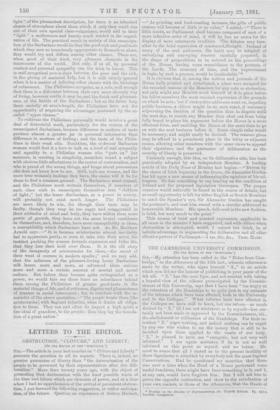LETTERS TO THE EDITOR.
OBSTRUCTION, " CLOTURE," AND LIBERTY.
[TO TIM EDITOR OF THE " SPRCTAT0R.1
Stn,—The article in your last number on " Cl4ture and Liberty" presents the question in all its aspects. There is, indeed, no greater guarantee of liberty than " the determination of the people to be governed by their representatives after due deli- beration." More than twenty years ago, with the object of promoting that deliberation with the least possible waste of the time and labour which are elements of power, and at a time when I had no apprehension of the arrival of persistent obstruc- tion, I put forward the following suggestion, or rather anticipa- tion, of the future. Quoting an expression of Sidney Herbert, —"As printing and book-reading increase, the gifts of public orators will become of little or no value," I added,—" There is little doubt, as Parliament shall become composed of men of a more reflective order of mind, it will be less an arena for the display of mere extempore. crudities. The debates may here- after be the brief expression of condenseastliought. Instead of many of the oral addresses, the habit may be adopted of embodying and conveying reasons carefully prepared, in the shape of propositions to be entered on the proceedings of the House, having some resemblance to the protests of the Lords. The economy of time, and the improvement in logic, by such a process, would be incalculable."
It is obvious that if, among the notices and journals of the House daily printed and distributed, a place were assigned for the recorded reasons of the Members for any vote or abstention, not only might any Member avail himself of it to place before his fellow-members the most succinct expression of the grounds on which he acts ; but if obstructive addresses went on, impeding public business, a &Ilan might be at once voted, if necessary adjourning the decision of the question then in dispute until the next day, to enable any Member thus shut out from being fully heard to place his argument before the House in a more effectual form, and enabling the House at the same time to go on with the next business before it. Some simple rules would be necessary, and might easily be devised. The reasons given may be affixed in a prominent place in the lobby or adjacent rooms, allowing other members with the same views to append their signature, and the guarantee of deliberation as the security of liberty is preserved.
Curiously enough, this idea, on its deliberative side, has been practically adopted by an independent Member. A leading article of the Daily News of Monday last begins :—" Driven by the stress of Irish loquacity in the House, Sir Alexander Gordon has hit upon a new means of influencing the opinions of his col- leagues. He has something to say bearing on the condition of Ireland and the proposed legislation thereupon. The proper occasion would naturally be found in the course of debate, but as small opportunity is left for either English or Scotch Members to catch the Speaker's eye, Sir Alexander Gordon has caught the postman's, and sent him round with a circular addressed to honourable Members. His speech, delivered in the new fashion, is brief, but very much to the point."
This means of brief and pointed expression, applicable in all cases in the manner I have suggested, and with Whim when obstruction is attempted, would, I cannot but think, be of infinite advantage, in augmenting the deliberative and all other. effective powers of Parliament. —I am, Sir, &e., Tuos. HAILE.






































 Previous page
Previous page